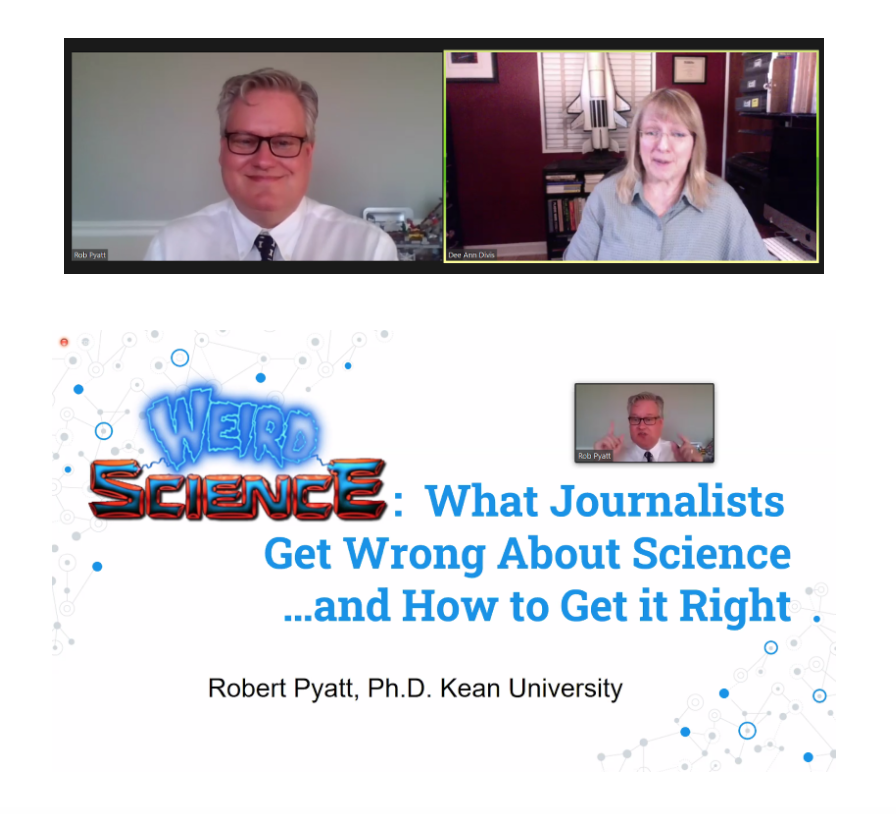
Dr. Rob Pyatt, seen above in the screen grab from a session during the virtual SPJ2020 on Sept. 12, said journalists misconstrue scientific studies often, and it shows up in their reporting. He is a molecular geneticist at Kean University, and was the featured speaker for “Weird Science: What Journalists Get Wrong About Scientific Studies … How to Get it Right.”
The student reporter who covered the session for SPJ2020 News, Monica Sager, said Pyatt pointed to “considerable issues — misinforming the public, skewing the research’s results and creating misleading situations” — that result from inaccurately summarizing a scientific study. To ensure an accurately informed public, articles in the media on scientific studies must be written critically and comprehensively, Pyatt said, according to Sager’s report.
Considering the amount of scientific information that is either in demand or being released during the current COVID-19 pandemic, it is imperative that the public have the correct information, and that all related information be presented accurately, even if a reporter is writing to debunk information that has been pushed by dubious sources.
This issue is at the heart of the DC Pro Chapter’s initiative on rectifying the “Censorship by PIO” that occurs when government agencies at all levels place public information officers as gatekeepers between journalists and the information that is gathered by employees who are paid with taxpayer funds. Kathryn Foxhall, a DC Pro Chapter member, and a chapter delegate to the SPJ business session held during the SPJ2020 conference, has been behind the chapter’s initiative. She authored a resolution passed by the session’s delegates “Opposing Restrictions on Speech that Could Worsen a Pandemic.”
On Sept. 25, she continued to press the matter with a letter to the heads of the National Academy of Sciences and the National Academy of Medicine, asking them to do what they can to see that scientists can freely talk to journalists so that the public is better informed about issues of vital importance.
“Thank for your important statement yesterday against the distortion and miscommunication of scientific evidence and your call for transparency to ensure public trust,” she wrote.
“SPJ-DC calls on the NAS leaders to go even further and to ask that government scientists and others be allowed to speak with the media to get the word out, rather than being silenced so that any administration can put out its own version of ‘science.’”
As SPJ said “in a resolution passed by its delegates just this month, SPJ has for many years decried, ‘the controls on speech that pressure people not to speak to journalists without notifying the authorities, often through public information officers,’” the letter continued.
In sharing her observations of the virtual format for SPJ2020, Foxhall reported:
“In a session on, ‘Pandemic: The Stories We Told,‘ I used my new skill of writing questions in the ‘chat panel’ and got a great quote from New York Times Science Correspondent Donald G. McNeil, Jr. He decried the current situation in CDC and HHS, saying, ‘It’s a horrible experience for a journalist trying to get life-saving information out of your own government.’”
Read more about that session on stories of the pandemic by clicking on this link.
The resolution passed at the business session states in conclusion:
THEREFORE LET IT BE RESOLVED that the Society of Professional Journalists, meeting in convention virtually on September 12¸2020, calls on the U.S. Department of Health and Human Services to explain why controls on the speech of its employees are safer for the public than is free speech and why that department has the right to decide this under the U.S Constitution.
Resolution 10 at SPJ2020
Resources for information about COVID-19 pandemic
At another session during SPJ2020, Dave Cuillier, associate professor at the University of Arizona School of Journalism and president of the National Freedom of Information Coalition, presented “FOI for a Cure: How to Get Health Records and Data.”
The session was advertised as providing practical tips for acquiring health data and records about COVID and other important health matters, including examples of useful records to acquire, strategies for overcoming denials, and stories that can help your community.
An attendee helpfully posted on Twitter a link to the session handout. Check it out yourself on this link.
Cuillier was national SPJ president 2013-2014.

